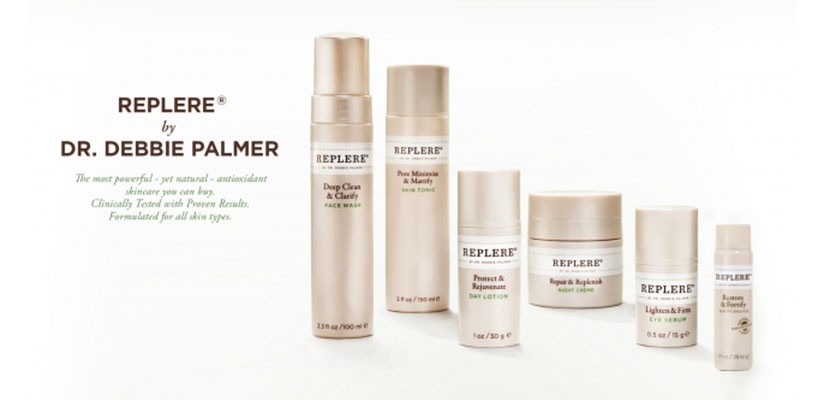Dr. Palmer Q&A: Aging & Antioxidants

Welcome to REPLERE!
Recently we passed the 3,000 "Like" mark on our Facebook page – woohoo! Facebook is an active, thriving community of Replere friends & family, and it's a place where we choose to share daily thoughts, inspirations, ideas and sometimes a recipe or two, as well as important information about Replere products. Still, we thought this might be a great time to talk about the backbone of Replere skincare – antioxidants – in more depth, for those who are new to the brand, the products and its philosophy.
A few quick Replere® facts:
• Created by dermatologist and leading antioxidant expert Dr. Debbie Palmer, REPLERE skincare products are formulated with Coffea arabica extract (or Green Coffee Extract), the un-ripened berry of the coffee plant, which is a top dietary source of antioxidants. They also contain a mix of other potent antioxidants including pine bark, goji and açai berries, grapeseed, pomegranate, green tea, and vitamins A, C, & E.
• REPLERE's exclusive blend of antioxidants neutralizes age-accelerating free radicals—created from exposure to sunlight, pollution (including secondhand cigarette smoke and car exhaust), emotional and physical stress, poor diet, and even exercise. In doing so, they slow down aging of the skin.
• REPLERE® crème formulas are packaged in airless containers to avoid decreased potency from air exposure - and bacterial contamination - that can occur though daily use. The REPLERE collection is also paraben, fragrance, BPA and dye-free. REPLERE products are vegan and never, ever tested on animals.
"I developed REPLERE as a collection of repair products for your skin, " says REPLERE founder Dr. Debbie Palmer. "They are designed to be applied to the skin first, under your moisturizer, and in weeks, they will make a visible difference in the overall appearance of your skin."
Now, let's discuss antioxidants, free radicals and what to do about them:
Q: We've heard a lot of talk about antioxidants being good for the body—and the skin. But if I'm a healthy person, and I take my daily supplements, do I really need antioxidants too?
Dr. Palmer: We all need—and use—oxygen to live. After we breathe it in, oxygen travels from our lungs to every cell in our body, helping to turn food into energy.
But oxygen can also have negative effects, whether you're healthy or not. Body cells are stable when their molecules have a full set of electrons. When oxygen enters the picture, though, they can lose an electron, becoming unstable or oxidized—the same chemical reaction that causes metal to rust. Losing an electron to a passing oxygen molecule converts that cell's molecule to an unstable, and damaging, atom known as a free radical.
Antioxidants are the body's main defense against free radicals. Antioxidants—which can be produced in the body or be obtained from food sources or, in the case of the skin, from topical products—donate missing electrons to free radicals and return them to a normal state.
Q: Why are free radicals so bad?
Dr. Palmer: Free radicals attack cells in the body. These attacks change the structure and function of cells and how they work. Cellular damage caused by free radicals is a key part of the aging process—and may even contribute to the development of some of our most prevalent diseases, including coronary artery disease and cancer.
When it comes to the skin, free radicals stimulate the production of enzymes, which break down collagen and elastin—triggering premature aging (wrinkles and sagging skin).
Q: Aren't free radicals caused by sun exposure?
Dr. Palmer: Yes, free radicals can be created in the body as a result of exposure to ultraviolet light (through sunlight or a tanning booth). But they can also be triggered through environmental exposure to cigarette smoke (breathing in secondhand smoke or even simply having it pass over the skin), car exhaust, factory pollution, pesticides (in our food and water supply), and insecticides (used in the home, our yards, and in the environment around us).
Poor diet (not eating enough fruits and vegetables and/or eating foods high in bad fats) can lead to the production of free radicals—as can lack of sleep and stress. Free radicals can also be formed while digesting large meals—why eating small, frequent meals is best.
Even exercise—though it's good for you—causes an increase in free radical production. Because of this, it's important to consume a diet high in antioxidants and to apply antioxidant products daily to your skin.
Q: So what can we do to slow down the production of free radicals in the body?
Dr. Palmer: Keep in mind that the human body has evolved the ability to produce natural antioxidants to protect it from free radical damage. But during times of high oxidative stress (caused by an imbalance between the production of reactive oxygen and a person's ability to neutralize it and repair the resulting damage), the body's natural antioxidants are not sufficient to control these free radicals, and excess damage and accelerated aging—even disease—can occur.
Eating the right foods and supplementing regularly serves to augment the body's natural supply of antioxidants, helping to prevent excess damage.
Coming up next month: To prep for the holidays, we'll talk about antioxidants & food and why it's so important to make sure we keep a balance between holiday treats and healthy treats.

